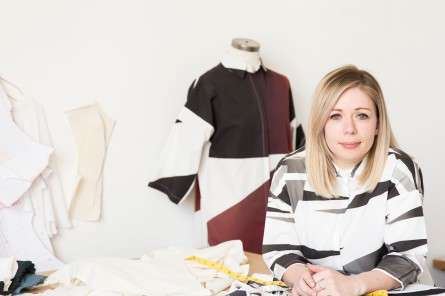Our enterprise competitions are back for another academic year, today we’re looking at a real success story…from entering our Fresh Ideas competition to running a successful business.
If you have an idea, then FRESH IDEAS is for you. From October to January EVERY MONTH you’ll have the chance to win a cash prize to help you develop your idea into a real business venture.
Toni Roddie, founder of womenswear label, Saunt & Sinner entered Fresh Ideas in 2012, whilst studying Fashion Design at Gray’s School of Art. During the competition, she took part in Start-Up Day which provides an opportunity for competition finalists to learn from experts on how to improve ideas and develop valuable skills including how to successfully pitch. Toni went on to win third place in the competition was also introduced to SIE’s Business Innovation Advisor, Dawn Shand. Dawn helped Toni to write a business plan and acted as a mentor.

Following her Fresh Ideas win, Toni was given additional support from Robert Gordon University’s business incubator programme, and secured £10,000 of seed money from a private investor.
Toni participated in the pilot year of Fashion Foundry, a programme of events, workshops, advice and bespoke mentoring for Scottish fashion designers run by Cultural Enterprise Office. She also took part in Entrepreneurial Spark’s business accelerator which includes free office space.
Toni launched her first capsule collection, The Broken Doll in March 2013. Since then, Saunt & Sinner has been worn by celebrities such as Emeli Sandé, Paloma Faith and Sophie Kennedy. Toni was also nominated for a Scottish Fashion Award in 2013 in the Young Scottish Designer of the Year category.
Do you have a business idea and fancy following in Toni’s footsteps? She has this piece of advice:
“Just go for it. There’s so much opportunity in Scotland. There are so many people out there who want to help and support you. Network as much as you can. Seek out funding and mentoring”.
Don’t worry if you don’t know a lot about business. That’s what we’re here for! The process is designed to help you develop your business know-how and show you how to turn a good idea into a successful new business. So even if you’re not a winner, you’ll still benefit from our help and be in a great position to take the next steps.
Monthly winners and highly commended entrants will have the chance to participate in Exploration Day (worth £150) in February and enter the next phase of the competition. The final top 5 entries, each winning up to £1000, will be announced at a special Awards Event in March 2017.
New this year, there will also be special awards recognising the best ideas meeting Scottish Government priorities. For 2016-17, these include: Healthcare, Food & Drink, and the Creative Industry. Apply online here.
Want the full story? Read Toni’s case study here.
http://www.sauntandsinner.co.uk


